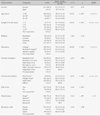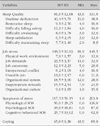Abstract
Purpose
The purpose of this study was to identify sleep quality, job stress, symptoms of stress (SOS), and coping and to examine factors influencing sleep quality in clinical nurses.
Methods
A cross-sectional study was conducted with 265 clinical nurses at three general hospitals. A self-administrated questionnaire was used for data collection, and data were analyzed using descriptive statistics, Pearson correlation coefficients, t-test, ANOVA, and backward multiple regression with the SAS statistical program.
Results
Sleep quality showed significant differences according to the sociodemographic characteristics of age, length of work, education, current workplace, current job position, shift work, and marital status. Sleep quality was negatively associated with SOS and job stress. Significant factors influencing sleep quality of the clinical nurses were cognitive-behavioral SOS, physiological SOS, inappropriate rewards, physical work environment, and shift work.
Conclusion
The findings indicate that cognitive-behavioral SOS, physiological SOS, job stress regarding inappropriate rewards and physical work environment, and shift work are useful to predict levels of sleep quality of clinical nurses. These factors should be considered when developing nursing interventions to improve sleep quality of clinical nurses through stress management.
Figures and Tables
Table 3
Correlations between Factors Influencing Sleep Quality

PWE=physical work environment; JD=job demands; JA=job autonomy; IC=interpersonal conflict; UJ=unstable job; OS=organizational system; IR=inappropriate rewards; OC=organizational culture; Phy. SOS=physiological symptoms of stress; Psy. SOS=psychological symptoms of stress; CB SOS=cognitive-behavioral symptoms of stress.
References
2. Akerstedt T, Knutsson A, Westerholm P, Theorell T, Alfredsson L, Kecklund G. Sleep disturbances, work stress and work hours: A cross-sectional study. J Psychosom Res. 2002; 53:741–748.
3. Doi Y, Minowa M, Tango T. Impact and correlates of poor sleep quality in Japanese white-collar employees. Sleep. 2003; 26:467–471.

4. Edéll-Gustafasson UM, Kritz EI, Bogren IK. Self-reported sleep quality, strain and health in relation to perceived working conditions in females. Scand J Caring Sci. 2002; 16:179–187.

5. Eller T, Aluoja A, Vasar V, Veldi M. Symptoms of anxiety and depression in Estonian medical students with sleep problems. Depress Anxiety. 2006; 23:250–256.

6. Faul F, Erdfelder E, Buchner A, Lang A-G. Statistical power analyses using G*Power 3.1: Tests for correlation and regression analyses. Behav Res Methods. 2009; 41:1149–1160.

7. Härmä M, Sallinen M, Ranta R, Mutanen P, Müller K. The effect of an irregular shift system on sleepiness at work in train drivers and railway traffic controllers. J Sleep Res. 2002; 11(2):141–151.

8. Im SB, Kim KE. Clinical nurses' job stress and coping strategies according to personality type. J Korean Acad Psychiatr Ment Health Nurs. 2005; 14:390–399.
9. Im SB, Yu SY, Seo EB, Lee SJ, Yun BR, Seo EJ, et al. The effects of shift work on the nurses' negative affectivity and sleep disorder. J Korean Acad Psychiatr Ment Health Nurs. 2006; 15:40–47.
10. Kilpatrick K, Lavoie-Tremblay M. Shiftwork: What health care managers need to know. Health Care Manag. 2006; 25(2):160–166.
11. Kim MG, Lee WC, Lee YM, Ryoo JH, Kim HC, Yoo SW, et al. Factors associated with quality on sleep of subway workers by shift-work. Korean J Occup Environ Med. 2008; 20(4):326–334.

12. Knudsen HK, Ducharme LJ, Roman PM. Job stress and poor sleep quality: Data from an American sample of full-time workers. Soc Sci Med. 2007; 64:1997–2007.

13. Korea Occupational Safety and Health Agency. Guideline for measuring job stressors (KOSHA CODE H-42-2006). Seoul: Author;2006. 12.
14. Kwon GJ. A study on shift work nurses' sleeping pattern according to their fatigue level and working type. Seoul: Ewha Womans University;2005. Unpublished master's thesis.
15. Kwon KH, Suh SR. Quality of sleep and its influencing factors in the institutionalized elderly. J Korean Acad Adult Nurs. 2009; 21(1):34–42.
16. Lazarus RS, Folkman S. Stress, appraisal, & coping. New York, NY: Springer;1984.
17. Lee SO, Ahn SH, Kim MO. A study on women's fatigue and sleeping disturbance. Korean J Women Health Nurs. 2005; 11(2):163–168.

18. Lee SW. A study on stress responses of Korean- American. J Nurs Acad Soc. 1992; 22:238–247.
19. Lee WH, Kim CJ. The relationship between depression, perceived stress, fatigue and anger in clinical nurses. J Korean Acad Nurs. 2006; 36:925–932.

20. Linton SJ. Does work stress predict insomnia? A prospective study. Br J Health Psychol. 2004; 9:127–136.

21. Mun MS. Active coping strategy model for chronic arthritis: Applying internal model of world and coping resource. Seoul: Hanyang University;1999. Unpublished doctoral dissertation.
22. Nasermoaddeli A, Sekine M, Hamanishi S, Kagamiori S. Job strain and sleep quality in Japanese civil servants with special reference to sense of coherence. J Occup Health. 2002; 44:337–342.

23. Ohayon MM, Lemoine P, Arnaud-Briant V, Dreyfus M. Prevalence and consequences of sleep disorders in a shift worker population. J Psychosom Res. 2002; 53:577–583.

24. Pelfrene E, Vlerick P, Kittle F, Mak RP, Kornitzer M, De Backer G. Psychosocial work environment and psychological well-being: Assessment of the buffering effects in the job demand-control(-support) model in BELSTRESS. Stress Health. 2002; 18:43–56.

25. Shirey MR. Stress and coping in nurse managers: Two decades and research. Nurs Econ. 2006; 24(4):193–211.
26. Spiegel K, Leproult R, Van Cauter E. Impact of sleep debt on metabolic and endocrine function. Lancet. 1999; 354:1435–1439.

27. Strine TW, Chapman DP. Associations of frequent sleep insufficiency with health-related quality of life and health behaviors. Sleep Med. 2005; 6:23–27.

28. Vaz Fragoso CA, Gill TM. Sleep complaints in community-living older persons: A multifactorial geriatric syndrome. J Am Geriatr Soc. 2007; 55:1853–1866.

29. Yi HR. Development of the sleep quality scale. Seoul: Ewha Womans University;2005. Unpublished doctoral dissertation.
30. Yoon JS, Kook SH, Lee HY, Shin IS, Kim AJ. Sleep pattern, job satisfaction and quality of life in nurses on rotating shift and daytime fixed work schedules. J Korean Neuropsychiatr Assoc. 1999; 38:713–722.




 PDF
PDF ePub
ePub Citation
Citation Print
Print






 XML Download
XML Download